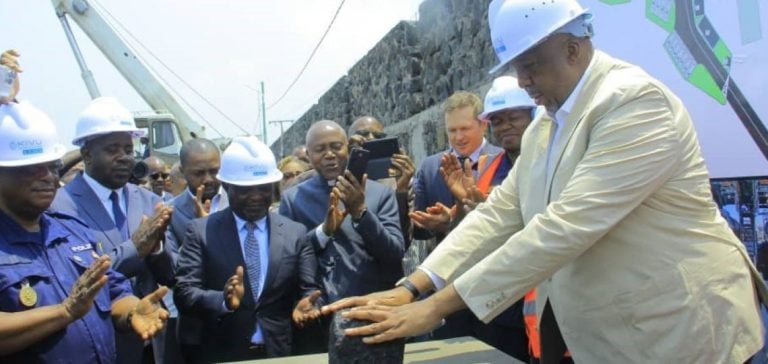The Democratic Republic of Congo (DRC) is developing a strategic project to improve fuel supply capacity in the Eastern region, an area often affected by recurring shortages and price fluctuations. The oil terminal under construction in Goma is part of a national strategy to strengthen energy infrastructures, within the framework of a public-private partnership between the State and KPS LOG.
The terminal, dedicated to the storage of land-based and aviation petroleum products, aims to streamline the logistics chain and secure supplies, thereby reducing the costs associated with fuel distribution.
With an operational capacity of 9 million liters and a surface area of 4 hectares, the terminal will enable us to better manage fluctuating fuel needs in the Eastern region, while improving the resilience of the oil sector in the face of logistical challenges.
By relying on modernized infrastructure, the DRC aims to avoid supply interruptions that disrupt economic and industrial activities in this strategic area of the country.
The terminal’s economic and logistical objectives
The new Goma terminal meets a pressing need: to improve the efficiency of transport and storage of petroleum products.
The eastern part of the DRC, due to its landlocked geographical position, is particularly vulnerable to variations in fuel prices, with direct repercussions on the cost of living and the competitiveness of local businesses.
This terminal should help to stabilize these fluctuations, by offering a reliable storage and distribution solution tailored to the needs of businesses and individuals in the region.
Hydrocarbons Minister Aimé Molendo Sakombi emphasizes that this project is part of the government’s roadmap to modernize the DRC’s oil sector.
The aim is to guarantee a more stable supply at lower cost for local companies, while improving the transparency of fuel flows.
In a country where energy infrastructures often remain dilapidated, this terminal symbolizes a commitment to transformation, fostering more robust economic development in the eastern region.
Cutting-edge technology and fraud prevention
In addition to its storage capacity, the Goma terminal will incorporate advanced technologies to meet international standards in terms of safety and fuel flow management.
The site’s equipment will comply with the standards set by the American Petroleum Institute (API), guaranteeing a high level of operational reliability.
Among the innovations planned, a real-time oil flow monitoring system will be implemented, designed to minimize the risk of fraud.
This initiative is in line with a broader program of molecular marking of petroleum products, launched by the Congolese government to combat smuggling and optimize public revenues.
This anti-fraud program is crucial in a country where losses linked to illicit practices in fuel distribution remain high.
By integrating these technologies, the Goma project aims to enhance transparency in the oil sector, thereby attracting more investment and promoting stability of supply.
Economic impact for local players
The Goma terminal represents a major opportunity for local businesses and economic operators, offering modern infrastructure that will improve inventory management and facilitate logistics for companies in the region.
Greater efficiency in the distribution of petroleum products will enable companies to better control their operating costs, and thus improve their competitiveness on the regional market.
The DRC, rich in natural resources, is looking to exploit its energy potential more strategically, by improving its infrastructure to attract more investment in the hydrocarbon sector.
By streamlining fuel supply, the Goma terminal represents a key step towards better management of the country’s oil resources, while ensuring greater price stability for local consumers.
Strengthening energy supplies also sends a strong signal to international players, particularly those investing in the DRC’s hydrocarbon sector.
By offering infrastructure in line with international standards, the DRC is positioning itself as a reliable partner, capable of meeting the requirements of economic players operating in the region.






















